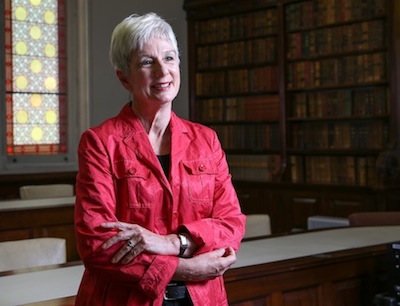Fighting for the rights of others

Catherine Branson
Coming back to the University of Adelaide has closed the loop on a remarkable career for newly appointed council member Catherine Branson.
After graduating from the University of Adelaide with law and arts degrees, the former country girl rose to the top ranks of her profession, becoming Crown Solicitor, a Federal Court judge and a determined advocate for the underprivileged as President of the Australian Human Rights Commission. An impressive resume for someone who never dreamed law could offer so much variety. But she credits much of her success to those early years on campus. "It was the late sixties and early seventies and I was involved in the second wave of feminism which first really opened my eyes to structural disadvantage," says Ms Branson. "Looking back I now know that university was an extremely influential and critical time for me and affected the whole of my subsequent life." Both her parents were fourth generation South Australians and Ms Branson and her elder brother, Lew Rayner, were the first from either family to gain a tertiary education. She was determined not to waste her opportunity. After graduating, her first "serious job" was as a tutor at the University of Adelaide's School of Law. Then she spent a year in the US doing voluntary legal aid work in Pontiac, a town just outside Detroit, Michigan, working mostly with extremely disadvantaged African Americans. She admits it was a serious eye-opener. "I was there not so very long after the race riots of the 60s and there were still vacant blocks where buildings had been destroyed," she says. "I hadn't, as a fairly privileged young person, ever experienced disadvantage to the extent that I saw it in Michigan. My interest in human rights has been with me since that time and it was something that I took with me into the judiciary." Discrimination law was among her speciality areas of law after returning to South Australia where she worked in private practice and also for the public sector. Her career continued to blossom and at the age of 35 she was appointed to the dual positions of Crown Solicitor of South Australia and Secretary of the Attorney-General's Department. From 1989 she practised as a barrister at the Adelaide Bar and was appointed a Queen's Counsel in 1992 prior to becoming a Federal Court Judge two years later. Over the next 14 years she heard all types of cases, including complaints of discrimination and judicial review of decisions involving refugees. As a Judge Ms Branson was not expected to be involved in public debate. Her next role as President of the Australian Human Rights Commission therefore presented numerous new challenges as she became a key spokesperson. "While equality before the law, fair play, and respect for all is at the heart of all judicial work, becoming President was very different to any sort of job I'd done before," she says. "That's what attracted me ultimately to the position." Ms Branson held the role for four years during which time Australia's treatment of its Indigenous people and asylum seekers was very much in the public spotlight. Today she remains both passionate and measured in her criticism. "By any test the conditions in which some of Australia's first peoples live puts us at risk of failing to meet our obligations under international conventions, including the International Covenant on Economic, Social and Cultural Rights," she says. "Our treatment of those who come to Australia by sea seeking asylum puts us, in my view, in breach of our obligations under the International Covenant on Civil and Political Rights. It is a serious thing to arbitrarily detain anyone." Throughout her career Ms Branson has been active in the community, holding senior board positions in numerous organisations involved in human rights as well as her other interests in areas such as the law, health, education and the arts. Now retired from full-time work, she is relishing the opportunity of experiencing university life once again. In 2011 she received a Distinguished Alumni Award from the University of Adelaide and the following year was awarded a Doctor of Laws (honoris causa) from the University of Flinders. She is also an Adjunct Professor at the University of Adelaide Law School, using her wealth of experience to inform and inspire students with "cameo appearances" as a guest lecturer. "It's lovely to be back at the University and to see how much has changed but also how much remains the same," she says. "For all sorts of reasons I'm getting a lot of pleasure from what I think is a fundamentally important South Australian institution - one that continues to play a very important role in this State as well as nationally and internationally."
|





